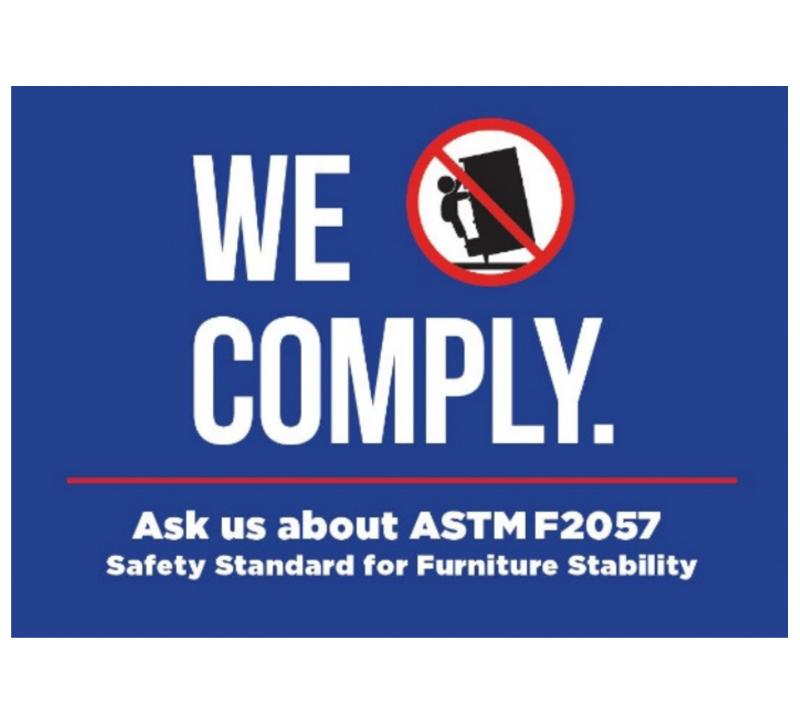Recent product recalls issued by manufacturers and retailers in conjunction with the U.S. Consumer Product Safety Commission (CPSC) point to the high cost of ignoring the industry’s voluntary stability standard for clothing storage furniture.
Members of the American Home Furnishings Alliance (AHFA) are making it easy for buyers to identify showrooms that carry compliant products by displaying a “WE COMPLY” tent card in their showrooms. The card identifies manufacturers whose products meet requirements of the voluntary stability standard for clothing storage furniture, ASTM F2057-19.
In addition, 13 AHFA member companies have had their stability testing process reviewed by UL (Underwriters Laboratory) as part of the Product Stability Verified program launched last year. Once the testing process has been reviewed by UL, companies submit stability test results for each clothing storage SKU. As those test results are verified, they are posted on the UL Verify website (https://verify.ul.com). Consumers can search the site by manufacturer or by the
product identification number to confirm that a product has received a scientific, third-party confirmation that it meets the stability requirements of the voluntary standard.
Participating companies include A.R.T. Furniture, Ameriwood Home, Ashley Furniture, Delta Children’s Products, Durham
Furniture, Gat Creek, Hooker Furniture, Klaussner Home Furnishings, La-Z-Boy Casegoods, Samson Marketing
(Universal Furniture and Legacy Classic Furniture), Sauder Woodworking, Simmons Kids, South Shore Furniture and
Vaughan-Bassett. These showrooms will display a tent card that says, “WE COMPLY and We’re Verified.”
“Although the stability standard is ‘voluntary,’ AHFA does not consider it optional,” states Bill Perdue, AHFA Vice President of regulatory affairs. AHFA developed the “WE COMPLY” campaign to help broaden industry awareness of the stability standard and to emphasize the importance of eliminating non-compliant products from the marketplace. AHFA also endorses the Stability Verified program for brands seeking credible, third-party verification of compliance.
ASTM International adopted the furniture stability standard, F2057, in 2000. It originally covered units over 30 inches in height but was updated earlier this year to include all residential clothing storage furniture 27 inches and taller.
Companies that display the “WE COMPLY” card have engineered their products to pass two stability performance tests outlined in the voluntary standard. Covered products also must carry a specified warning label to help alert consumers to tip-over hazards, and they must be shipped with tip restraints along with instructions for installing the restraints. (All tip restraints must comply with a separate standard, F3096.)
To pass the stability performance tests, an empty unit cannot tip when all doors (if any) are open and all drawers are open to the “stop,” or open two-thirds of the way if there is no “stop.” Covered units also cannot tip when one drawer is open to the “stop” (or two-thirds of the way if there is no “stop”) and a 50-pound weight is applied to the center front of the open drawer. This second test is repeated for each drawer (and door, if any) in the unit.
In February, CPSC Deputy Executive Director DeWane Ray advised the industry that products failing to meet the voluntary stability standard would be deemed a “substantial product hazard” by CPSC. The agency’s enforcement team will consider noncompliant products “as having a defect which could present a substantial product hazard” under the Consumer Product Safety Act, he added. “Should we encounter such products, we shall initiate an investigation and will
seek the corrective action we believe is appropriate.”
Those corrective actions frequently include a recall. Manufacturers or retailers who fail to report non-compliant furniture can be subject to civil penalties.
Earlier this year, CPSC officials purchased 187 clothing storage units from online sources, then tested them for compliance with the voluntary stability standard. At AHFA’s Regulatory Summit earlier this month, CPSC staffer Michael Taylor, who serves as the agency’s tip-over project manager, said the agency focused on purchasing units identified as “best sellers.”
Taylor reported about 9 percent of the units failed the stability tests. So far three recalls appear to have resulted from the testing.
AHFA has worked with furniture manufacturers, the CPSC and child safety experts for nearly two decades on safety measures, including the ASTM voluntary stability standard, designed to increase the stability of residential furniture and to reduce the number of furniture tip-over accidents.







